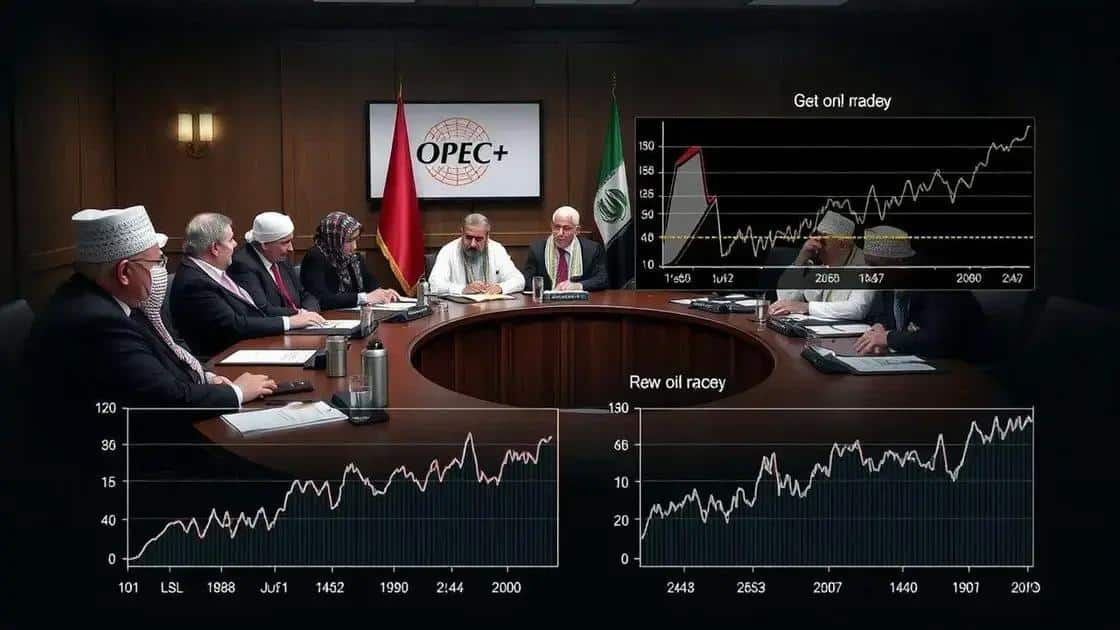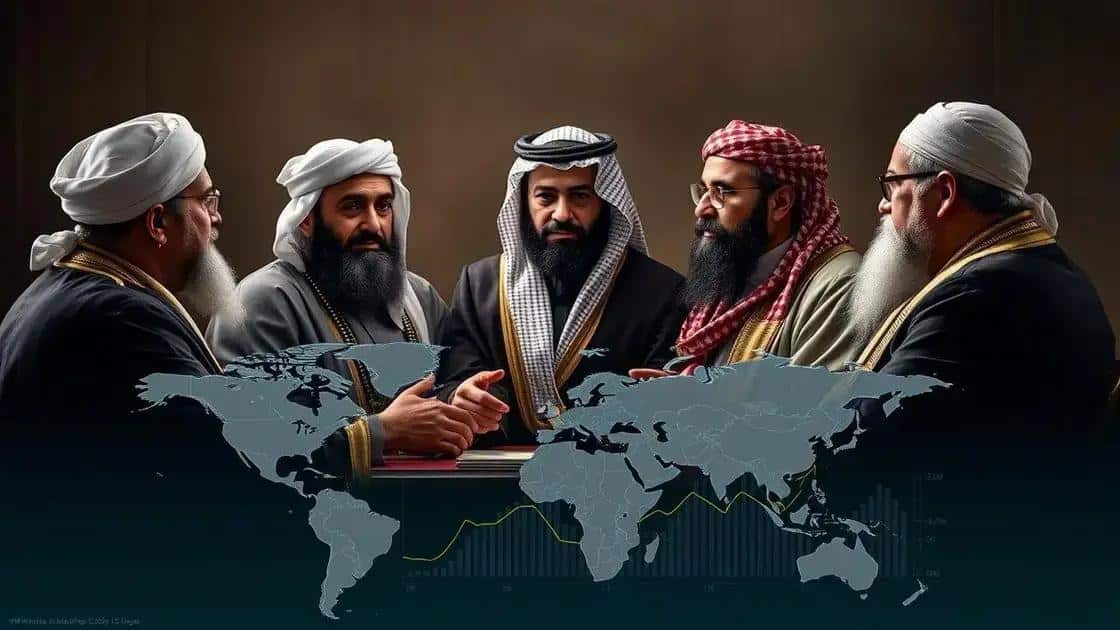OPEC+ decisions market reaction: what you need to know

Anúncios
OPEC+ decisions significantly influence oil prices by adjusting production levels to respond to market demands and geopolitical events, impacting global economies and consumer costs.
OPEC+ decisions market reaction is a term that often shapes economic discussions globally. Have you wondered why these decisions matter so much? Let’s dive into their impact on your everyday life.
Anúncios
Understanding OPEC+ and its role in the global market
Understanding OPEC+ is crucial for grasping its impact on the global market. This organization plays a significant role in regulating oil production worldwide. By controlling supply, OPEC+ aims to stabilize or influence oil prices, affecting global economies.
What is OPEC+?
OPEC+, which includes OPEC and other oil-producing nations, works together to manage oil production levels. Its members coordinate policies to ensure a steady supply of oil while also trying to keep prices at a desirable level.
Anúncios
How OPEC+ Influences the Market
The decisions made by OPEC+ can lead to major shifts in oil prices. When they decide to cut production, prices usually rise. Conversely, if they increase production, prices may drop. This influence extends beyond just oil, impacting economies globally.
- Economic stability in oil-dependent countries
- Pricing adjustments for consumers and businesses
- Shifts in global trade dynamics
Many countries rely heavily on oil imports, which means that fluctuations in prices can have a wide-ranging impact. For instance, increased oil prices can lead to higher costs for goods and services, affecting everyday life.
The Global Impact of OPEC+
OPEC+ decisions don’t just shape oil markets; they also influence geopolitical relationships. Countries that depend on oil exports are often in a strong position, which can alter international relations. The balance of power can shift based on oil pricing, making OPEC+ a key player on the world stage.
In summary, OPEC+ has a profound effect on the global market. Understanding its mechanisms helps in navigating the complexities of oil prices and their broader implications. The interplay between supply, demand, and geopolitics in the oil market remains a topic of interest for economists and policymakers alike.
Recent OPEC+ decisions and their significance

Recent OPEC+ decisions have had notable impacts on global oil production and pricing. These choices reflect the organization’s response to shifting demands and geopolitical tensions. Understanding these decisions helps in grasping their significance in today’s market.
Impacts on Oil Prices
Each time OPEC+ announces production cuts or increases, the markets react swiftly. For instance, an announcement of reduced output often leads to a spike in oil prices. This behavior is a direct response to the lowered supply in the market, highlighting the organization’s strong influence.
Geopolitical Considerations
The significance of OPEC+ decisions isn’t limited to economics. These decisions can also shift geopolitical power. When oil becomes scarce, countries dependent on imports face challenges. This puts pressure on them to find alternative energy sources, potentially reshaping global alliances.
- Shifts in global trade patterns
- Increased energy costs for consumers
- Changes in diplomatic relations between oil-producing countries and importers
Recently, OPEC+ decided to maintain production levels despite rising global demand. This decision signals a cautious approach, as they aim to avoid oversupply and protect their interests. The monitoring of inventory levels and market trends plays a critical role in these deliberations. By taking their time, OPEC+ aims to achieve a balance in oil markets while considering the broader implications of their actions.
Future Implications
The significance of these recent decisions extends into the future. Analysts predict that sustained high prices could accelerate the shift toward renewable energy sources. As countries look for stability, OPEC+ decisions will remain a central point of analysis for economists and industry experts.
In conclusion, understanding the context behind OPEC+ decisions is essential for grasping their significance. These choices influence not only oil prices but also global economic and political landscapes. Staying informed about these developments can help individuals and businesses navigate the complexities of the energy market.
How market reactions shape oil prices
Understanding how market reactions shape oil prices is vital for anyone following global economics. The oil market is sensitive to a variety of factors, including news events, supply changes, and geopolitical tensions. Each action can trigger immediate reactions in prices, making it a dynamic environment.
Factors Influencing Market Reactions
Recent events such as OPEC+ decisions greatly influence market perceptions. When OPEC+ announces cuts in production, traders often respond quickly, sending prices upwards. This creates a ripple effect, impacting not just oil but also related goods.
The Role of Speculation
Another significant aspect is speculation. Traders speculate on future price movements based on current events and forecasts. This can lead to rapid increases or decreases in oil prices, as the market reacts to potential outcomes.
- Economic reports and their timing
- Natural disasters affecting production
- Political instability in oil-producing countries
For example, when tensions rise in a major oil-producing region, even a hint of conflict can lead to significant price hikes. The market quickly prices in the potential disruption, demonstrating its reactive nature. Similarly, positive news about a breakthrough in energy technology can cause prices to drop, as the future demand for oil becomes uncertain.
Consumer Impact
These fluctuations have direct implications for consumers. Higher oil prices often result in increased costs for products and services. Conversely, lower oil prices can lead to savings for consumers, making it important to stay informed on market trends to anticipate changes.
In summary, the interactions between market reactions and oil prices create a complex landscape that influences economies worldwide. Understanding these dynamics is crucial for predicting future trends and making informed decisions regarding energy consumption and investments.
What to expect from future OPEC+ decisions

What to expect from future OPEC+ decisions is a question on many investors’ minds. As the global economy evolves, so do the strategies of this influential coalition. OPEC+ will likely continue to play a crucial role in regulating oil supply and balancing market conditions.
Continued Production Adjustments
One expectation is that OPEC+ will maintain its approach of adjusting production levels based on market dynamics. When demand rises or falls significantly, expect OPEC+ to respond by increasing or decreasing oil output. This approach helps stabilize prices and ensures that oil producers can profit while maintaining market balance.
Geopolitical Influence
Geopolitical events will also shape future decisions. Tensions in oil-producing regions, such as the Middle East, can directly affect oil supply. OPEC+ might adapt its production strategies based on these developments to mitigate potential supply disruptions caused by political instability.
- Focus on sustainable energy transitions
- Adaptation to changing global energy demands
- Partnerships with non-OPEC producers
Another aspect to consider is the shift towards sustainability. As more countries invest in renewable energy, OPEC+ might explore partnerships with non-OPEC oil producers to further influence global oil markets. This collaboration could help both groups adapt to the changing landscape while still supporting oil prices.
Market Reactions
The reactions of global markets to OPEC+ decisions will continue to be a critical factor. Traders closely monitor news from OPEC+, reacting impulsively to any announcements. Therefore, keeping an eye on these developments can provide valuable insights for investors and consumers alike.
As OPEC+ navigates through a complex global landscape, its decisions will shape the future of oil markets significantly. Staying informed about these potential changes will be crucial for those impacted by the oil economy.
FAQ – Frequently Asked Questions about OPEC+ and Oil Prices
What is the role of OPEC+ in the oil market?
OPEC+ plays a significant role in regulating oil production levels to stabilize prices and ensure a balance between supply and demand.
How do OPEC+ decisions impact oil prices?
Decisions made by OPEC+, such as production cuts or increases, directly affect global oil prices and can lead to market fluctuations.
What should consumers know about oil price changes?
Consumers should be aware that oil price changes can impact the cost of goods and services, affecting daily expenses.
How do geopolitical events influence OPEC+ decisions?
Geopolitical events, especially in oil-producing regions, can lead OPEC+ to adjust production strategies to manage potential supply disruptions.





